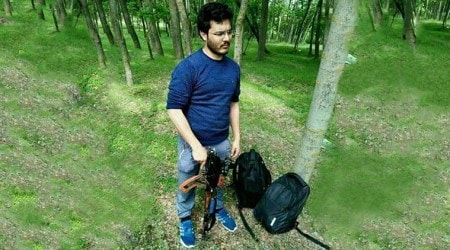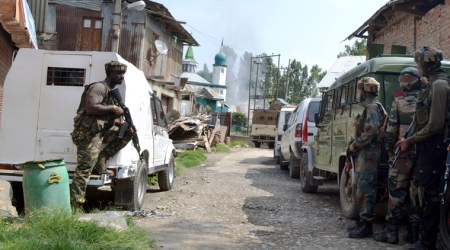 In Afghanistan, taking a woman’s name can be an act of serious provocation or chutzpah. Photo credit: UNAMA/Zachary Golestani
In Afghanistan, taking a woman’s name can be an act of serious provocation or chutzpah. Photo credit: UNAMA/Zachary Golestani
In many societies, including ours, women’s names have traditionally been treated differently than men’s names. Women’s names, at least in part, are treated as far more dispensable, officially and socially. They are often supported by the father’s, and then replaced by the husband’s name. Her existence would be corroborated with (wife/of) her husband’s name but the opposite (a man identified as husband/of) would frequently be meted out with a ridiculous reception. In large parts of Afghanistan, this is carried out to the extreme where even wedding cards and tombstones frequently omit the woman’s name entirely — only the names of men she is related to are provided.
In Afghanistan, taking a woman’s name can be an act of serious provocation or chutzpah. As New York Times journalist Mujib Mashal mentions, Afghan men in these areas refer to their wives in public with other terms like ‘Mother of my Children’, ‘My Household’, ‘My Weaker One’ and in some far pockets, as even ‘My Goat’ or ‘My Chicken’. Male schoolchildren get into brawls over it as they are taught that their family’s honour is sullied if someone mentions their mother’s or their sister’s name. In a campaign last month, some young women activists in Afghanistan challenged this trend via an online campaign called #WhereIsMyName in regional languages. The activists opined that no name equals to no identity, wherein a woman’s existence is reduced to her relationship to the male members of family. The campaign calls on for women to reclaim their names and call on Afghans to bring women’s names to their lips.
“Many times I meet wonderful women with bright thoughts and opinions during my work trips, but when I want to interview them or take pictures they say to me, ‘Let me ask my husband, father or brother if they allow me to talk or be pictured,’” Farzanah Wahidi, a female photojournalist from Kabul, told Thomson Reuters.
Somaia Ramish, a member of the Herat provincial council in Afghanistan and women’s rights activist, pointed out in a recent online article that according to Afghan law, the name of a child’s mother is not registered in any of his/her official documents from infancy to old age, even though that hers is the womb that carried the individual. “The interesting thing, however,” writes Ramish, “is that the mother then, out of habit and tradition, becomes identified by the child. The woman whose name has no place in laws all of a sudden becomes ‘the mother of Ahmad’ or ‘the mother of Mahmoud’”.
Taliban was the familiar modern oppressor of Afghan women who had taken away their right to work and education, rendering them powerless and invisible. But the women’s roles and identity (a lack thereof) have been designed and dictated, especially in rural Afghanistan, by something much older. Though it is easy to confuse the tribal traditions practised in Islamic countries with the religion of Islam, it is important to note that the non-written Pashtun tribal code, known as Pashtunwali, is the law which has governed the Pashtuns (Afghanistan’s most populous tribe) even prior to their embrace of Islam.
“According to tribal logic, the important thing is the ownership of a woman’s body,” Afghan sociologist Hassan Rizayee told the New York Times. “The body of a woman belongs to a man, and other people should not even use her body indirectly, such as looking at her. Based on this logic, the body, face and name of the woman belong to the man,” he explained. Under the same tribal code, women are also not permitted to inherit property — not even as much as they are permitted under Islamic law of Afghanistan. Asking for property for most women outside the cities is tantamount to bringing shame upon the family, which precludes their doing so.
#WhereIsMyName is a result of the social change spurred by greater connectivity to other parts of the world via the internet. Unsurprisingly, it is therefore a group of young people in urban areas who have been at the helm of it, challenging high profiled persons to reveal and voices the names of their female family members. The campaign received the support of thousands of Afghans including journalists, authors, senior government officials and artistes such as the renowned Afghan singer Farhad Darya.
Unmistakably, there are plenty of detractors too, who see it as nothing less than an onslaught on ‘Afghan values’ and ‘Afghan women’s honor’ or simply as too small and urban to make any difference. Others expressed reservations towards the lack of acceptance such ideas are likely to meet in the conservative Afghan society. “We don’t have a problem mentioning the mother’s name on the birth certificate or on other relevant documents, but in Afghanistan’s culture people aren’t ready for such a modern step,” Abdullhah Atahi, a spokesman for the High Court in Kabul told Thomson Reuters, “It may invite unwanted chaos.”
But activists believe that the battle for women’s names must go on. While real change in society, especially in the rural areas, is a very slow process, especially when it is connected with deep rooted tradition and sacredness of ‘family honor’, the greatest achievement of the campaign for now is probably that it has permeated regular media including newspapers and talk shows and become a topic of conversation.

